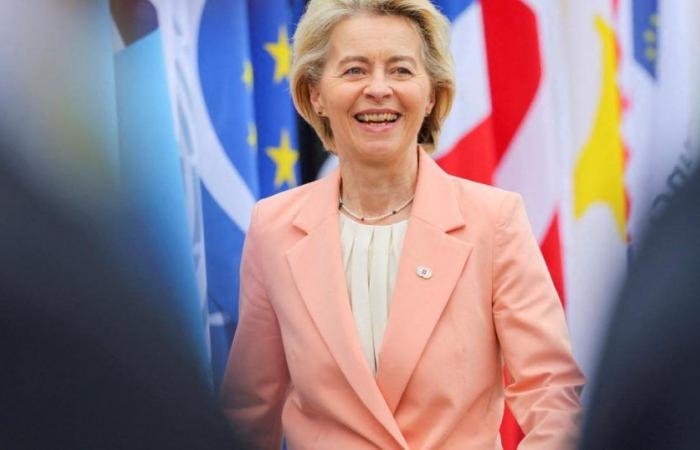FOCUS – The outgoing president of the European Commission is expected to be reappointed for a five-year term later this summer. But the process of his appointment remains complex.
Ursula von der Leyen is poised to obtain a second term as head of the European Commission. His designation has not yet been officially confirmed by the Twenty-Seven, meeting in Brussels this Monday, June 17 in an informal meeting. But it could be announced at the end of the summit on June 27 and 28. The process of appointing the President of the European Commission has sometimes been criticized for its lack of clarity, or even its lack of democratic legitimacy. In reality, the terms of this designation have evolved in recent years and obey complex and often unknown rules.
The EU institutions as a whole, including the Commission, regularly arouse incomprehension among the general public who may judge them to be too distant or “technocratic”. At the head of the main body of the European executive, Ursula von der Leyen has nevertheless played a leading role in the policies carried out over the last five years in Brussels. From the purchase of anti-Covid vaccines to the European post-epidemic recovery plan, including the Green Deal or the Migration and Asylum Pact, nothing was done without the former German Minister of Defense. The question of its possible renewal is therefore highly strategic.
The presidency of the European Commission is awarded by the Twenty-Seven every five years following the European elections, taking into account the results of the vote. Since the establishment of the “Spitzenkandidaten” (“Best Candidates”) system, European political parties nominate their candidate for Commission President before the elections. The European Council then nominates the candidate of the winning party. This system was introduced during the 2014 European elections to respond to criticism by strengthening the democratic legitimacy of this appointment, but is not free of controversy either.
Read alsoFrançois-Xavier Bellamy: “There is a generation on the right who refuses poaching and denials”
The EPP big winner in the European elections
On June 9, it was the European People’s Party (EPP – liberal and conservative right) to which Ursula von der Leyen belongs which unquestionably emerged as the big winner of the elections. With 189 seats, it is in a strong position in the “Grand Coalition” that it forms with the socialists (S&D) and the centrists to vote on most European texts. The latter in fact only obtained 136 and 81 seats respectively.
But everything is not so simple in Brussels. To be reappointed, Ursula von der Leyen must be appointed by the Twenty-Seven by reinforced qualified majority. In EU technocratic jargon, this means that the proposal must have the support of 72% of member states, or 20 out of 27, representing at least 65% of the European Union’s population. However, the EPP also has a majority in the European Council, but does not have a reinforced qualified majority, as most large countries are not led by the right. For example, neither Emmanuel Macron in France, nor Olaf Scholz in Germany, nor Pedro Sánchez in Spain belong to the EPP movement, even though their voice carries particular weight in the Council, given the size of their country.
However, the appointment of Ursula von der Leyen should only be a matter of time. No other name seems likely to attract all the necessary votes. First, because Macron, Scholz like Sánchez are not in a strong position in the negotiations, the parties corresponding to their political sensibilities having been disavowed during the June 9 election. The French president thus abandoned the idea of proposing the former Italian president of the European Central Bank Mario Draghi, whom he had once defended against Ursula von der Leyen. An alternative which seemed in any case compromised, since it would have required Draghi to be designated by Italian Prime Minister Giorgia Meloni as commissioner for Italy.
Above all, the political crisis triggered in France by the surprise dissolution of Emmanuel Macron pleads in favor of a choice of stability. If the National Rally entered Matignon at the end of the anticipated legislative elections on June 30 and July 8, there is no doubt that the tremors induced for French political life would be felt all the way to Brussels.
Read alsoCould the “extreme right” constitute a blocking minority in the European Parliament?
”
data-script=”https://static.lefigaro.fr/widget-video/short-ttl/video/index.js”
>
Meloni queen maker
However, when Ursula von der Leyen was actually reappointed at the end of June, she would only have taken the first step. Since 2009 and the Lisbon Treaty, the choice of the Twenty-Seven must now be validated by the new European Parliament, which auditions the candidate and organizes a vote by absolute majority. Ursula von der Leyen will therefore have to collect the absolute majority of votes (361 out of 720) of the new MEPs who will vote on July 18 by secret ballot.
It is undoubtedly before the MEPs, more than at the European Council, that the real uncertainty lies for the German Christian Democrat. In 2019, Ursula von der Leyen needed the support of the Polish PiS which sat within the group of European Conservatives and Reformists (ECR) to be elected… with only 9 majority votes! Even though the tripartite coalition supposed to support it between PPE, S&D and Renew had on paper 417 MEPs, almost 60 more than the absolute majority. In the new Parliament, this “Grand coalition” only brings together 408 elected officials…
To avoid a fatal loss of votes in her own camp, Ursula von der Leyen should turn to Giorgia Meloni and the Fratelli d’Italia deputies who sit at ECR and whose votes could prove decisive. Votes that Meloni could negotiate, in exchange for a commissioner with an important portfolio at the European Commission.
What would happen if Ursula von der Leyen was not knighted by the new Strasbourg Assembly? In this scenario, the European treaties give the Council a period of one month to nominate a new candidate, whose appointment should again be validated by Parliament. But will MEPs want to superimpose a European crisis on top of the probable French crisis which will follow the anticipated legislative elections? Response July 18.






